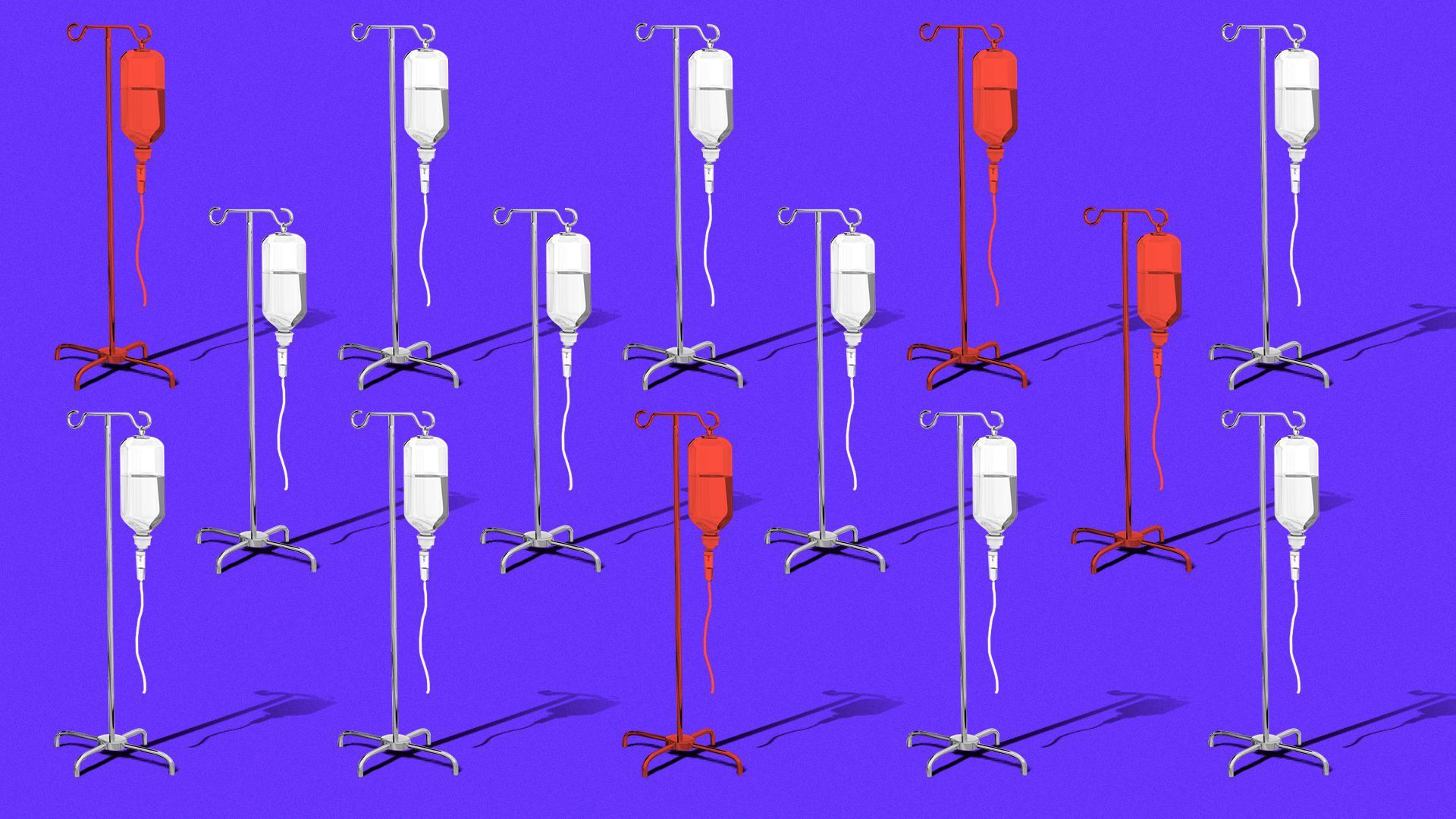Plus: "Alarming" colorectal cancer trend | Wednesday, October 27, 2021
| | | | | | | Presented By PhRMA | | | | Axios Vitals | | By Tina Reed ·Oct 27, 2021 | | Good morning, Vitals readers. Today's newsletter is 763 words or a 3-minute read. Situational awareness: Merck said Wednesday it will share its antiviral COVID pill formula with developing countries, Axios' Jacob Knutson writes. | | | | | | 1 big thing: FDA panel OKs kids' vaccines |  | | | Illustration: Annelise Capossela/Axios | | | | An FDA advisory committee signed off yesterday on allowing kids ages 5–11 to get Pfizer's COVID-19 vaccine, although some members didn't seem to think the shot will make quite as much difference for kids as it has for adults. - "There are high-risk individuals. I think they do need to be attended to. We do need to provide a vaccine for them," said the NIH's Michael Kurilla, the single vote to abstain. But for others, the benefits may not outweigh the risks, he said.
- Kids are at a relatively low risk of severe illness, compared to adults, but COVID-19 is the eighth leading cause of death among children right now — so, even if kids are less vulnerable than adults, the benefits of a vaccine still outweigh the risks, the panel said.
Some members also feared that authorizing the vaccine for kids would lead to vaccine mandates in schools, which they opposed. What's next: Interim FDA commissioner Janet Woodcock is expected to make the authorization this week. |     | | | | | | 2. "Alarming" trend in colorectal cancer |  | | | Illustration: Aïda Amer/Axios | | | | Young adults with colon cancer are just as likely to die from the disease as older people — in some cases, maybe even more likely — according to a study to be published today in the Journal of the National Cancer Institute. Why it matters: Colorectal cancer is among the fastest-growing cancers among people younger than 50, and researchers aren't sure why. What they're saying: "It struck us that these patients were younger, they had fewer comorbidities, they had better performance status and were more physically active and they had less side effects from the treatment," said Kimmie Ng, director of the Dana-Farber's Young-Onset Colorectal Cancer Center. - "But their survival was exactly the same," she said.
Between the lines: While her study group had too few patients younger than 35 to have a statistically significant result, Ng said the team observed a "particularly concerning" trend of lower survival rates in that population. |     | | | | | | 3. Centene to bid out $30 billion of drug spending |  | | | Centene is shifting back to an external PBM. Photo: Pavlo Gonchar/SOPA Images/LightRocket via Getty Images | | | | Centene will evaluate proposals from pharmacy benefits companies next year to manage its drug spending, signaling a failure of the company's own approach to managing drug spending internally, Axios' Bob Herman writes. Why it matters: Centene spends $30 billion annually on prescription drugs, CFO Drew Asher told investors Tuesday, which will make this one of the largest and most highly sought-after drug contracts in the industry. Centene's bid process will start next year, and a new PBM will take over by 2024, executives said on a conference call, adding that the move will result in "the greatest economic benefit." Flashback: Centene fired its pharmacy benefit manager, CVS Caremark, in 2018 and shifted the drug purchasing functions to its own PBMs, RxAdvance and Envolve. - That move put the company in hot water.
- Centene set aside more than $1 billion earlier this year to resolve allegations that its PBM overcharged state Medicaid programs for prescription drugs.
- Centene also incurred a $229 million charge on its investment of RxAdvance.
The bottom line: Centene failed to manage drug spending in house. Now its drug contract is "going to be a huge opportunity for an external PBM," Asher said. |     | | | | | | A message from PhRMA | | Fixing health care means putting patients first | | |  | | | | From out-of-pocket costs, to deductibles, to hospital bills – the most vulnerable patients face challenges. 3 in 10 Americans who have insurance still face a financial barrier to care. We need to make the cost of medicine more predictable and affordable. Learn more. | | | | | | 4. Book: Moderna almost ran out of vaccine cash | | Moderna almost ran out of money for its mRNA vaccine manufacturing in the spring of 2020 after CEO Stéphane Bancel failed to raise the funding needed, according to a book out Tuesday from the Wall Street Journal's Gregory Zuckerman. The big picture: In the book "A Shot to Save the World: The Inside Story of the Life-or-Death Race for a COVID-19 Vaccine," Zuckerman writes that Bancel struck out with the likes of the Gates Foundation and WHO's COVAX initiative, and it left their scientists "despondent." - "Look, if you don't help us, and this [vaccine] works, it will cost hundreds of thousands of lives, if not hundreds of millions ... We need help," a colleague quoted Bancel as saying.
What he's saying: That's pretty much the same as Bancel's message now. - "We did not get any help to build manufacturing in Q1 and early Q2 when we asked for it the [from] the largest governments and the largest foundations. We did not get one penny. And as each week was passing, it meant less doses for December once the vaccine got authorized, and less doses in Q1 2021," he said in an email to Axios.
|     | | | | | | 5. Catch up quick | - All the fast food you love contains hormone-disrupting chemicals, study finds. (Gizmodo)
- CDC says some immunocompromised people can get fourth COVID shot. (Axios)
- Birx testified Trump's White House failed to take steps to prevent more virus deaths. (New York Times)
- Theranos investor Betsy DeVos was misled by Elizabeth Holmes on the tech and financials, representative testifies. (CNBC)
|     | | | | | | A message from PhRMA | | Fixing health care means putting patients first | | |  | | | | From out-of-pocket costs, to deductibles, to hospital bills – the most vulnerable patients face challenges. 3 in 10 Americans who have insurance still face a financial barrier to care. We need to make the cost of medicine more predictable and affordable. Learn more. | | |  | | It'll help you deliver employee communications more effectively. | | | | | | Axios thanks our partners for supporting our newsletters. If you're interested in advertising, learn more here.
Sponsorship has no influence on editorial content. Axios, 3100 Clarendon Blvd, Suite 1300, Arlington VA 22201 | | | You received this email because you signed up for newsletters from Axios.
Change your preferences or unsubscribe here. | | | Was this email forwarded to you?
Sign up now to get Axios in your inbox. | | | | Follow Axios on social media:    | | | | | |







No comments:
Post a Comment